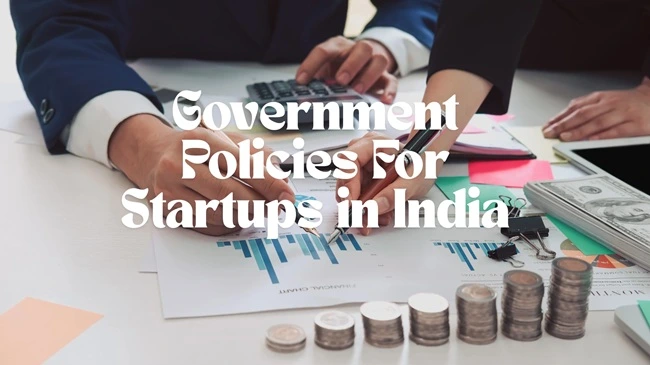Startup in India : Your Startup Dream Begins Here
Starting a business is one of the most exciting journeys you can embark on. But let’s be honest, it also comes with its fair share of questions, confusion, and paperwork. If you’re wondering what government policies and schemes can help you, especially in the early stages, you’re not alone.
In fact, India has introduced several founder friendly policies, incentives, and schemes under its Startup India, MSME, and other flagship programs that can significantly ease your startup journey, financially, operationally, and legally.
This blog is your step by step guide to understanding those policies. If you’re someone with a great idea but no clue where to begin, this is exactly what you need.
Why Government Policies Matter for New Startup in India
The Indian government has been actively promoting entrepreneurship and startups, recognizing them as engines of employment and innovation. With Startup India, Digital India, Make in India, and Atmanirbhar Bharat, there are now dozens of policies to reduce red tape, offer funding, and promote ease of doing business.
Whether you’re in tech, retail, agriculture, or manufacturing, there’s a high chance that a policy or scheme is available to support you.
Key Government Schemes & Benefits Every New Startup in India Should Know
Let’s break this down category by category for better clarity:

1. Startup India Initiative (DPIIT Recognition)
Category: All startups (tech, D2C, SaaS, education, health, etc.)
What Is It?
Launched in 2016, Startup India is a flagship initiative that supports innovation, job creation, and ease of business for startups.
Major Benefits:
- DPIIT Recognition: Register with the Department for Promotion of Industry and Internal Trade (DPIIT) to access exclusive benefits.
- Tax Exemption for 3 Years under section 80-IAC (must be incorporated after April 1, 2016).
- Angel Tax Exemption under Section 56(2)(viib).
- Easy Winding Up: Close your startup within 90 days if needed.
- Self Certification for 6 labour laws & 3 environment laws.
- Fast Track Patent Examination at reduced cost.
Who Can Apply?
- Startup must be less than 10 years old.
- Turnover must be under ₹100 crore.
- Should be working towards innovation or improvement.
How to Apply?
- Register on startupindia.gov.in
- Submit pitch, company details, and required documents.
- Await DPIIT recognition.
2. MSME (Micro, Small, Medium Enterprises) Registration
Category: Manufacturing, Trading, Service based businesses
Benefits:
- Collateral Free Loans under the Credit Guarantee Fund Scheme (CGTMSE)
- Subsidy on Patent Registration and bar code registration
- Market development assistance
- Industrial Promotion Subsidy
- Electricity bill concessions (varies by state)
- Cheaper interest rates and priority sector lending
Classification (Based on Investment + Turnover):
| Enterprise Type | Investment Limit | Annual Turnover |
|---|---|---|
| Micro | ≤ ₹1 crore | ≤ ₹5 crore |
| Small | ≤ ₹10 crore | ≤ ₹50 crore |
| Medium | ≤ ₹50 crore | ≤ ₹250 crore |
How to Register?
- Apply on udyamregistration.gov.in
- Aadhaar and PAN required.
3. MUDRA Loans (Micro Units Development & Refinance Agency)
Category: Small businesses, traders, artisans, and micro startups
Loan Types:
| Scheme | Loan Limit | Ideal For |
|---|---|---|
| Shishu | Up to ₹50,000 | Startups in very early stage |
| Kishor | ₹50,001 to ₹5 lakhs | Established but growing business |
| Tarun | ₹5 to ₹10 lakhs | Scaling businesses |
Benefits:
- No collateral needed
- Low interest rates
- Easy application via your bank
Where to Apply?
- Any public/private sector bank
- Online at mudra.org.in
4. SIDBI Assistance for Startups
Category: Innovative and high growth potential startups
The Small Industries Development Bank of India (SIDBI) offers equity, venture debt, and working capital assistance to startups and MSMEs.
Major Offerings:
- Fund of Funds for Startups (FFS): Government investment into SEBI registered VC firms which fund startups.
- Credit linked capital subsidy scheme (CLCSS)
- Soft loans for tech upgradation.
Visit www.sidbi.in for latest schemes.
5. Atmanirbhar Bharat Abhiyan Policies
Category: Manufacturing, exports, agriculture, digital businesses
Several reforms under Atmanirbhar Bharat support self reliant businesses:
- Production Linked Incentive (PLI) Schemes for manufacturers in 14 sectors.
- Emergency Credit Line Guarantee Scheme (ECLGS) for MSMEs during crisis.
- Digital payments infrastructure benefits for fintech startups.
- ₹50,000 crore equity infusion for MSMEs via Fund of Funds.
6. Tax & Legal Benefits
Category: All new companies registered under Companies Act or LLP Act
Key Benefits:
- Startup India 3 year income tax holiday
- Capital gains tax exemption if invested in eligible startups
- Minimum Alternate Tax (MAT) exemption for certain periods
- Carry forward losses if original shareholders continue
Also, various state governments offer stamp duty exemptions for incorporation.
7. Women Entrepreneurship Schemes
Category: Female founders / women-led startups
Government Schemes:
- Mahila Udyam Nidhi Scheme by SIDBI soft loans up to ₹10 lakhs.
- TREAD Scheme (Trade Related Entrepreneurship Assistance for Women) – 30% govt. grant.
- Annapurna Scheme – working capital for food businesses.
- Stand Up India – loans from ₹10 lakh to ₹1 crore for women and SC/ST entrepreneurs.
8. State-Specific Startup Policies
Several states have their own incentives. If your startup is based in a particular state, check the Startup Cell or Industry Department of your state.
Example Benefits:
| State | Benefit Highlights |
|---|---|
| Gujarat | ₹30,000/month grant, patent cost reimbursement |
| Karnataka | Funding up to ₹50 lakh via Elevate program |
| Maharashtra | Incubation support, free co-working space |
| Rajasthan | Rebate on electricity and internet bills |
| Telangana | T-Hub, RICH incubation, no-cost mentorship |
9. Startup Incubators & Accelerators (Govt Supported)
Category: Idea to MVP stage
Government has established a strong incubation ecosystem:
- NIDHI PRAYAS – ₹10 lakh prototyping grants.
- Atal Incubation Centres (AICs) – Mentoring, seed funding.
- Technology Business Incubators (TBIs) – for tech innovation.
- TIDE 2.0 by MeitY – Digital startup support.
Look for IIT/IIM/NIT-based incubators near you for high quality support.
10. Skill Development & Hiring Support
Category: Startups hiring freshers or skilling staff
- National Apprenticeship Promotion Scheme (NAPS) – Subsidy on stipend.
- Pradhan Mantri Kaushal Vikas Yojana (PMKVY) – Training support.
- Startup India Learning Program – Free courses on startup growth.
Startup in India : Frequently Asked Questions (FAQs)
1. Can I avail more than one scheme?
Yes! A single startup can benefit from multiple schemes like DPIIT recognition, MSME loans, SIDBI support, etc., as long as eligibility criteria are met.
2. Do I need to register my business to get benefits?
Yes, registration as a company, LLP, or sole proprietorship is essential to apply for most schemes.
3. Are these schemes applicable to service based businesses?
Absolutely. Tech, SaaS, ed-tech, health-tech, and service-led businesses are eligible under Startup India and MSME schemes.
4. Is it mandatory to have a tech product?
No. Even non-tech startups like handmade products, agri-processing, or cloud kitchens can benefit from policies.
Startup in India Final Thoughts: Start Smart, Start With Support
Government policies can act as a safety net and launchpad for your startup. From funding and tax benefits to mentorship and market access, there’s no shortage of support if you know where to look.
Your journey as a founder is already challenging, don’t make it harder by missing out on what’s already available.
So if you’re dreaming of building the next big thing, start with the right foundation, leverage these schemes, register your startup, and get moving. The support is already out there. Now, the move is yours.
Quick Links for Founders
- Startup India Portal
- Udyam MSME Registration
- MUDRA Loans Info
- SIDBI Startup Schemes
- Invest India State Policies
For more Startup News and Update, please follow Popnewsblend.com

Hi, I’m Prashant Jain — a curious soul, storyteller, and content creator at heart.I’ve always been drawn to the world of entertainment, travel, sports, health & lifestyle — not just as a writer, but as someone who genuinely lives these experiences. Whether I’m binge-watching the latest OTT series, exploring offbeat spiritual destinations in India, or diving deep into wellness routines and cricket match insights, I love sharing what I discover with like-minded readers.
PopNewsBlend is my way of blending personal journeys with meaningful stories — ones that inform, inspire, and keep you ahead of the curve. Everything I write comes from real observations, hands-on experiences, and a deep passion for understanding the world around us.







